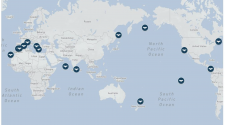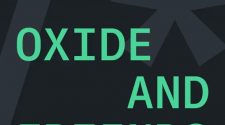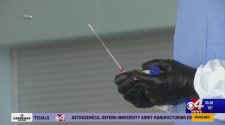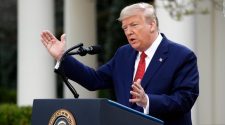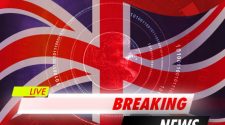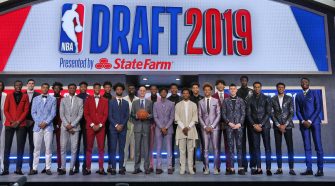And so it was Wednesday morning that Trump presented a sulking, brooding president as he engaged on the sidelines of the NATO summit at a secluded estate here outside London. Trump abruptly cancelled a planned news conference at the summit’s conclusion, arguing that he had already answered so many questions from reporters in other settings during his visit to England.
Asked by journalists about Trudeau’s mockery, Trump fired back at the Canadian prime minister. He then threatened to cancel a planned news conference at the summit’s conclusion.
“Well, he’s two-faced,” Trump said of Trudeau. “And honestly, with Trudeau, he’s a nice guy. I find him to be a very nice guy. But, you know, the truth is that I called him out on the fact that he’s not paying 2 percent and I guess he’s not very happy about it.”
During their Tuesday meeting, Trump needled Trudeau over Canada’s defense spending, labeling the country “slightly delinquent” for failing to meet NATO’s defense spending guidelines for member nations of 2 percent of gross domestic product.
Trump’s visit to the NATO summit was erratic. The president who has long criticized the 70-year-old alliance, at times this week cast himself as its defender, while at other moments chastised allies for, in his view, taking advantage of the United States.
During a meeting with German Chancellor Angela Merkel on the summit sidelines, Trump told the small pool of journalists traveling with him that he might cancel his scheduled news conference — “unless you’re demanding a news conference, and then we’ll do one,” he said.
In addition to Trump’s focus on NATO spending, both Macron and Turkish President Recep Tayyip Erdogan stepped up as potential disrupters at the summit.
Macron declared Wednesday that he was satisfied with the conversation he had stirred up with comments saying that NATO was suffering from “brain death” and slamming Trump’s single-minded focus on defense spending yet again.
“I think our responsibility is to lift the ambiguities that can be harmful and to take on a real strategic debate,” Macron said as he entered the meeting. “Our debate should concern things other than financial questions alone.”
Late Tuesday, he vowed in a tweet to “stand up for the French and European interests” at the meeting.
NATO Secretary General Jens Stoltenberg pushed back Wednesday against Macron’s warnings about the health of the alliance, growing animated as he trumpeted what he said were NATO’s successes in recent years.
“That’s not the case,” Stoltenberg said on his way into the meeting, after being asked whether the alliance’s brain activity had indeed flatlined. “NATO is agile, NATO is active, NATO is adapting.”
He said that the disagreements were not a challenge to NATO’s fundamental mission of defending each other in case of attack.
“Disagreements will always attract more attention than when we agree,” Stoltenberg told reporters. “The strength of NATO is that we have always been able to overcome these differences and unite around our core task to protect and defend our children.”
Trump was scheduled for a day of highs and lows: After the three-hour discussion with all 28 other NATO leaders, he planned to have lunch with representatives from countries that are meeting alliance spending guidelines of 2 percent of gross domestic product — the “NATO 2%ers” as the White House dubbed the coalition. It could be a moment to showcase his efforts to boost European defense contributions, which have been a fixation for Trump throughout his presidency.
Trump met privately with Turkey’s Erdogan on the sidelines of the summit. Unlike Trump’s other meetings with foreign counterparts, his visit with Erdogan was not on his public schedule and journalists were not permitted to cover it. After the Turkish government shared a photograph of the tete-a-tete on social media, a White House spokesman confirmed that the two presidents had met. They discussed trade, energy and regional security challenges, according to the White House.
Trump also met one-on-one with Merkel, who has clashed with him in the past. Germany says it will meet the spending goals only in 2030, six years later than it agreed in 2014.
Trump on Tuesday previewed an acrimonious discussion with Merkel by calling Germany and some other countries “delinquent.” He argued that their current spending levels put an unfair burden on the United States, and he threatened to retaliate with a trade war.
“Some are major delinquent, some are way below 1 percent, and that’s unacceptable, and then, if something happens, we’re supposed to protect them, and it’s not really fair,” Trump said during a meeting with Trudeau. “It never has been fair, and they’re paying up. We are talking to Germany tomorrow, and they are starting to come along. They have to. They have to. Otherwise, if they don’t want to, I’ll have to do something with respect to trade.”
While in London, Trump has found that the summit’s host, Johnson, has been avoiding public contact with him. Johnson faces an election on Dec. 12, and with Trump deeply unpopular in Britain, too much face time between the two populists could be politically toxic.
Trump tweeted Wednesday that the two men had a cordial conversation the evening before.
“Enjoyed my meeting with Prime Minister @BorisJohnson of the United Kingdom at @10DowningStreet last night,” Trump wrote. “Talked about numerous subjects including @NATO and Trade.”
Johnson tried to brush off a question Wednesday morning about why he was avoiding photos with Trump, declaring that “I’m going to be photographed with every possible leader of NATO. We’re having a very successful meeting.”
Later, Johnson warned of the stakes of the alliance’s success.
“Seventy years on, we are rock solid in our commitment to NATO,” he said. “History shows that peace cannot be taken for granted.”
At the meeting, leaders are expected to approve a slew of new defense plans in a choreographed move intended to paper over the contentious relations of recent years. They will agree that outer space is a military domain that NATO needs to defend.
They will also discuss how the alliance should handle the rise of China as a potential strategic threat. And they will agree on plans for Europe and Canada to spend more money on NATO’s central budget, to save the United States some money — a drop in the bucket in the context of overall defense spending, but still a symbolic gesture toward Trump’s demands that other countries pick up some of the slack.
Leaders are also expected to clash about a Turkish demand that the alliance give concessions about the Kurdish fighting groups in northeastern Syria that have been a key U.S. partner in the fight against the Islamic State. Erdogan says the Kurds are dangerous terrorists — and he has blocked unrelated approvals for updated military plans to defend the Baltics from Russia until he gets his way.
It was unclear Wednesday whether leaders would be able to agree on a compromise at the meeting.
Chiu reported from Washington. Katie Mettler in Washington also contributed to this report.
James McAuley in Paris contributed to this report.






